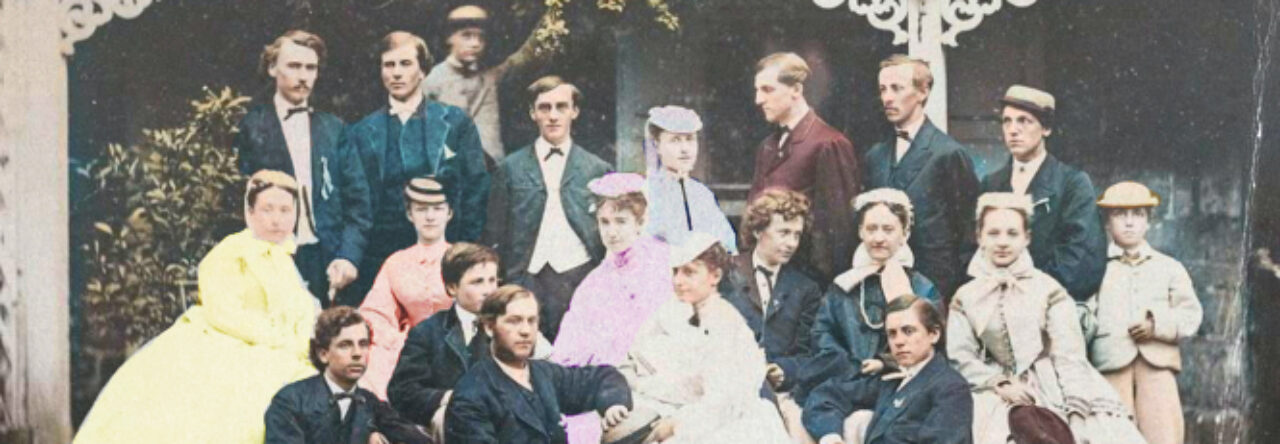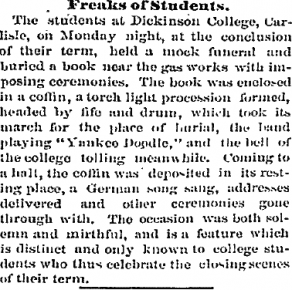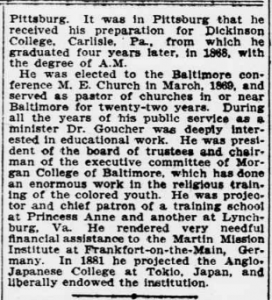Newspaper Research
Columbia Spy (Columbia, PA)., Saturday, July 4, 1868; Front Page: Column 7
To get a feel for using different online databases, and as a preliminary check, I ran John Franklin Goucher’s name through Nineteenth Century U.S. Newspapers, Accessible Archives, Civil War Era, and Historical Newspapers; all subscription based collections available through Dickinson. No results in the first three, but there was a short piece on a reception held for Goucher at the University of Southern California in the Historical Newspapers Database.
Unlike the other resources, with this one there were over a hundred results, but many of them either had no mention of Goucher, or were brought up simply because they included the names “John” or “Franklin”. A search of “Goucher” with the same date restrictions had more results, as could be expected, which meant a greatly increased number of extraneous articles, and a couple that were actually relevant to my research, like obituaries. I also ran “Goucher” through the other subscription-based sites, and had results similar to my first searches there.
This isn’t entirely unexpected; Goucher and everyone else in the Class of 1868 lived most of their adult lives after the time of the Civil War. Goucher in particular was known for his international presence, and is therefore unlikely to have been a major subject in any of the more local publications, especially those that focused on the after-effects of the war, or issues of race in post-slavery America.
“Dickinson College” had similarly lackluster results in all the aforementioned programs. It’s important to note that this is due in part to my search terms. I didn’t dedicate more than a couple hours to searches in these databases. There are many more combinations of words and places to try– I didn’t exhaust all my options in that respect by any stretch of the imagination. However, there is a point when perseverance becomes inefficient and it makes more sense to move on to other sources if they are available.
Chronicling America was the most useful for my purposes. Simple searches of “John Franklin Goucher” and “Dickinson College” bring up the kind of specific results needed for this entry. There are obituaries, notices of departure in the social pages, and for Dickinson College, two articles explaining financial difficulties.
After these discoveries, the challenge became finding articles that offered a different or unique perspective, while also providing information. In 19th Century U.S. Newspapers, I found a paragraph on Alexander Cook Chenoweth in the gossip pages of a New Orleans publication that mentions the discovery of several ancient artifacts on his property, and his own amateur archaeological pursuits. There was very little information of substance, though, so it’s the obituary from Chronicling America that I’ve included here:
New-York tribune., April 16, 1922, Page 14: Column 6
This excerpt provides a tidy summary of A .C. Chenoweth’s life, and perhaps areas for further research– for example, records of the Croton aqueduct, or those of the various societies of which he was a member.
The partisan leanings of a newspaper are unlikely to have a huge effect on its obituary of a non-political figure, but regardless, I looked at the “New-York Tribune” description in the Chronicling History website: it was Republican-affiliated.
The only other article of interest I could find related to Chenoweth, again with 19th Century U.S. Newspapers, was one detailing his claim to a large portion of the city of Baltimore, due to what he maintained were his ancestral ties to Oliver Cromwell. All in all, he seems a rather eccentric figure.
Through Chronicling America, this time with the search “Goucher anglo-japanese college”, I located this article:
Evening star., November 22, 1907, Page 18: Column 1
Full page here, courtesy of the Library of Congress, Chronicling America.
This piece in the Evening Star (no political affiliation, according to Chronicling America, Wikipedia, and Readex) addresses not only Goucher’s resignation as President of the college he founded, but also his various involvements in other educational institutions, his philanthropy, and his Methodist missionary work around the world. It has greater detail than the majority of obituaries I examined.
This was by no means the only article made available with these search terms; I had a hard time deciding which to include. There are multiple articles on missionary activity, including one detailing Methodist Conference allocation of funds according to country and program. Goucher is mentioned, again for his association with the Anglo-Japanese College. There is more on the College that doesn’t have to do with Goucher; many newspapers tracked the travels of the “First Japanese Bishop”, a man named Honda who made multiple visits to the U.S. for Methodist conventions and speeches on global education. He was a graduate of Aoyama Gakuin (the Anglo-Japanese College), and so appeared in many of my searches.
To track down John Franklin Goucher in foreign publications, I first tried to find a list of Methodist missionary newspapers. Yale has a very comprehensive list, but I was unable to locate links to actual PDF files of the papers, which leads me to believe many have not yet been digitized. Princeton has a digitized collection of the “Japan Mail”, an english-language paper based in Yokohama in the 19th century, that I believe might include more information on the Anglo-Japanese College and perhaps Goucher himself. Unfortunately, access is only available for Princeton students.
Lastly, there is a link that pops up in the Dickinson Database Search when one types in “Historical Newspapers”. Historical Chinese Newspapers is a resource I have yet to fully explore, but a quick search of Goucher’s name reveals that he had an obituary in the “Chinese Recorder”, a newspaper based in Shanghai:
Returning to Pennsylvania, I located two articles dealing with Dickinson College’s lack of an endowment in 1866. The more entertaining read is this heartfelt plea for funds from an unknown author in the “New York Methodist”:
The evening telegraph., October 19, 1866, FIFTH EDITION, Page 2: Column 3
In short, the article describes Dickinson’s position as a bastion of the Methodist faith, from its great founders to the fine young men it educates in the mid 19th century. It also details the college’s need for funds, as money is apparently so short that the faculty is only paid half of their due, and the entire institution is in danger of shutting down.
This would have been extremely relevant to the students enrolled in the college at the time. There may be exaggeration in the article, but regardless, the uncertainty of the future of the school would have had an impact, particularly on the faculty, if the account is to be believed.
Clearly the appeal worked, as Dickinson is still functioning today.
Full page here.
Additional Work
Local Carlisle newspapers from the 19th century have not yet been digitalized, so the only way to access them is through microfilm. I was able to examine the Carlisle Herald through the records of the Cumberland County Historical Society.
The Carlisle Herald was a Republican-affiliated publication during the years I focused on, 1864 to 1868 (Fralish). This partisan tilt was evident in its endorsement of Ulysses S. Grant in the first column of every second page. There was also the occasional snide comment directed towards more Democratic-leaning papers, and multiple references to “Copperheads”, a Republican term for anti-war Democrats (Wikipedia.com).
It took two hours of flipping through microfilm to go backwards from August 1868 to October 1866, looking for any mention of Dickinson College or its students. In this brief span, I was unable to uncover any particularly compelling accounts of student activities. The class of 1868 appears to have been relatively well behaved.
I found an article on the death of Dickinson President Andrew Johnson and his obituary, a piece on the 1868 Commencement and all the events associated with graduation, and something about the anniversary celebrations for the Belles Lettres and Union Philosophical societies. In terms of relevance, Johnson’s death probably had the most impact on the students, but the other two articles directly mention members of the class of 1868 by name and detail the subjects about which they spoke, something that, to me, is of greater interest.
Page numbers were not listed anywhere on the microfilm images, so it was impossible to note on which page these articles were, however, I did note the dates: the literary society article was in the Friday, December 24, 1866 edition, and the Commencement in the Friday, June 26, 1868. Neither are on the title page. They fall under the “Town and County” section of the news.
There was no author listed for either.
As a final note, I discovered something interesting in the microfilm. There are a surprising number of international topics mentioned in the Carlisle Herald for a small-town Pennsylvania publication.
There were stories on the excavations at Pompeii, articles titled “Japanese Men and Women”, “Exploration of the Nile Tributaries”, “An Eastern Romance” (this supposedly taking place in Cairo), “An immense gold-field has been discovered in Peru”, “Burning Widows” in “Jhallowar, Rajpoutara” and the “Exposition Universelle” in Paris, just to name a few. This seems an excellent topic for later exploration: the way young Americans in 1868 perceived the world, and how they were influenced by the publications of the time.
Citations
“Mid-19th Century Cumberland County Newspapers”, John C. Fralish, In the collections of the Cumberland County Historical Society.
Nineteenth Century U.S. Newspapers (through Dickinson College subscription)
Accessible Archives (through Dickinson College subscription)
Civil War Era (through Dickinson College subscription)
Historical Newspapers (through Dickinson College subscription)
PA Civil War Era Newspapers Collection (Penn State)
Chronicling America (Library of Congress)
Historical Chinese Newspapers (through Dickinson College subscription)











Leave a Reply